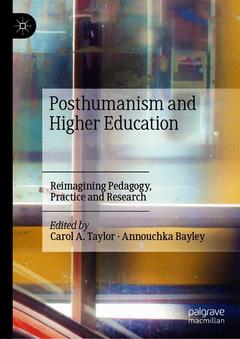Posthumanism and Higher Education, 1st ed. 2019 Reimagining Pedagogy, Practice and Research
Coordonnateurs : Taylor Carol A., Bayley Annouchka

Analyse how higher education can be rethought and move towards posthumanism
Reconceptualizes the academy and offers new way for academics and researchers to do higher education differently
Encourages imagination and creative thinking in re-thinking higher education
Date de parution : 05-2019
Ouvrage de 375 p.
14.8x21 cm
Disponible chez l'éditeur (délai d'approvisionnement : 15 jours).
Prix indicatif 147,69 €
Ajouter au panier


